skills acTion Plan for The food and Beverage secTor - Department of ...
skills acTion Plan for The food and Beverage secTor - Department of ...
skills acTion Plan for The food and Beverage secTor - Department of ...
You also want an ePaper? Increase the reach of your titles
YUMPU automatically turns print PDFs into web optimized ePapers that Google loves.
• Promote careers to parents, youth, teachers <strong>and</strong><br />
careers advisors that reflects the reality <strong>of</strong> working<br />
in the <strong>food</strong> <strong>and</strong> beverage sector (ie. how sophisticated<br />
jobs are now).<br />
• Support initiatives from the Human Capability Group<br />
in Horticulture <strong>and</strong> Agriculture, which involves a<br />
schools’ curriculum strategy with goals to increase<br />
the pr<strong>of</strong>ile <strong>of</strong> the sector, change schools’ perception<br />
<strong>of</strong> the sector, increase the number <strong>of</strong> people seeking<br />
careers in the sector (eg. more science students), <strong>and</strong><br />
introduce resources across the curriculum. In addition<br />
<strong>and</strong> alignment with this work, encourage a coordinated<br />
cross sectorial approach to career promotion in<br />
schools.<br />
Background<br />
It is apparent that <strong>for</strong> education <strong>and</strong> training to be<br />
taken up, there needs to be greater awareness <strong>of</strong> the<br />
opportunities such occupations <strong>of</strong>fer. This is an area in<br />
common with priority three, “Attractive Careers”. <strong>The</strong><br />
focus <strong>of</strong> this area in priority two is the way the primary <strong>and</strong><br />
secondary parts <strong>of</strong> the education system communicate the<br />
realities <strong>of</strong> working in the <strong>food</strong> <strong>and</strong> beverage sector.<br />
2.3 Responding to Changing<br />
Occupations <strong>and</strong> Skill Needs<br />
Action Points<br />
• Explore ways to improve the ability <strong>of</strong> the <strong>skills</strong> <strong>and</strong><br />
training system to adapt to rapidly changing <strong>and</strong> new<br />
occupations.<br />
• Increase support <strong>for</strong> initiatives that could be<br />
undertaken by Learning Representatives <strong>and</strong> build on<br />
current work with a group <strong>of</strong> ITOs to integrate literacy<br />
training with industry training (eg. in sea<strong>food</strong> <strong>and</strong><br />
agriculture).<br />
• Communication <strong>of</strong> the relationship between high levels<br />
<strong>of</strong> foundation <strong>skills</strong> in <strong>food</strong> <strong>and</strong> beverage businesses<br />
<strong>and</strong> favourable productivity results.<br />
• Increase support <strong>and</strong> encouragement <strong>for</strong> the uptake<br />
<strong>of</strong> relevant vocational qualifications (inclusive <strong>of</strong> higher<br />
level qualifications) that provide a good match to<br />
associated job opportunities.<br />
• Continue <strong>and</strong> extend active support <strong>for</strong> alternative<br />
employment (preferably in the <strong>food</strong> <strong>and</strong> beverage<br />
sector) with tailored programmes <strong>for</strong> individual workers<br />
<strong>and</strong> investment in education <strong>and</strong> training <strong>for</strong> employees<br />
affected by business closures, downsizing <strong>and</strong><br />
relocations. This would involve working with employers,<br />
unions, ITOs, other education providers <strong>and</strong> agencies <strong>of</strong><br />
government <strong>and</strong> local government.<br />
Background<br />
Due to the introduction <strong>of</strong> new technology (incl. upgrades),<br />
integration <strong>of</strong> production processes, productivity<br />
innovations <strong>and</strong> convergence with other sectors (eg. <strong>food</strong><br />
<strong>and</strong> health, <strong>food</strong> <strong>and</strong> hospitality), traditional occupations<br />
<strong>and</strong> career paths are changing (ie. from low to high value<br />
work). It is important that education <strong>and</strong> training reflects<br />
these needs, <strong>for</strong> which employees are able to adapt existing<br />
<strong>skills</strong> <strong>and</strong> develop new ones. It is also important that<br />
employers provide a flexible work environment. Education<br />
<strong>and</strong> training should not only be provided to those whose<br />
jobs are changing but also to those whose jobs have<br />
changed.<br />
As with other industries, the <strong>food</strong> <strong>and</strong> beverage sector<br />
has a spectrum <strong>of</strong> <strong>skills</strong> that range from top talent to<br />
foundation level. Investment in foundation <strong>skills</strong> may be<br />
just as important as investment in relevant vocational<br />
qualifications <strong>and</strong> higher education.<br />
<strong>The</strong>re is usually a strong relationship between a<br />
work<strong>for</strong>ce’s foundation <strong>skills</strong> <strong>and</strong> the level <strong>of</strong> labour<br />
productivity within a business, thus demonstrating the<br />
need <strong>for</strong> employers <strong>and</strong> government to invest in foundation<br />
<strong>skills</strong>. ITOs are currently piloting the integration <strong>of</strong><br />
foundation learning (work in progress) into industry training<br />
<strong>and</strong> ensuring training <strong>and</strong> foundation learning is available to<br />
low skilled workers.<br />
37


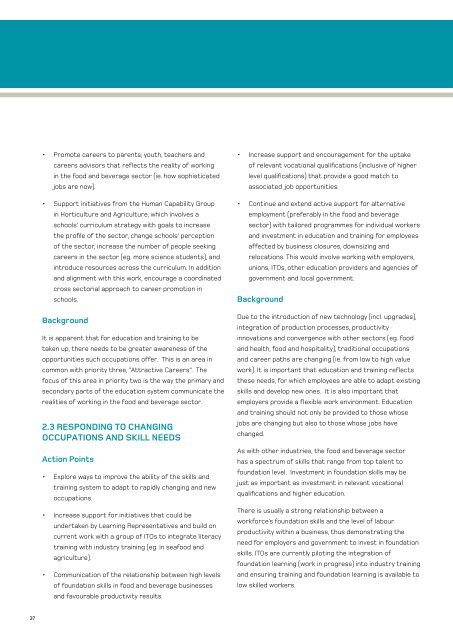


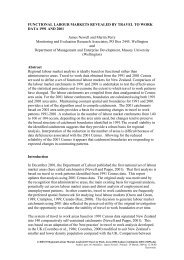
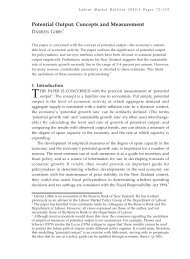

![a note on levels, trends, and some implications [pdf 21 pages, 139KB]](https://img.yumpu.com/27285836/1/184x260/a-note-on-levels-trends-and-some-implications-pdf-21-pages-139kb.jpg?quality=85)
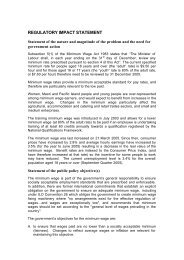

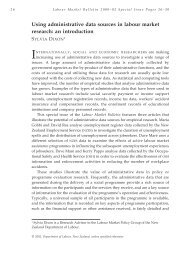



![Labour Market Trends and Outlook - 1996 [pdf 18 pages, 94KB]](https://img.yumpu.com/27285764/1/184x260/labour-market-trends-and-outlook-1996-pdf-18-pages-94kb.jpg?quality=85)

